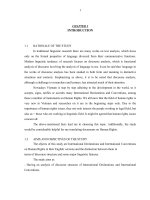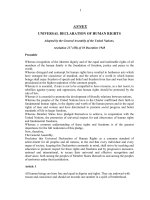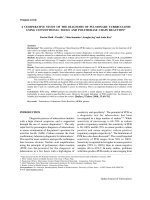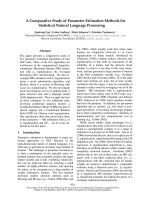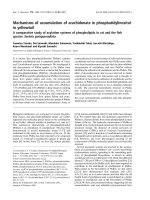A comparative study of discourse structures and some major linguistic features of international declarations and international conventions on human rights part 4
Bạn đang xem bản rút gọn của tài liệu. Xem và tải ngay bản đầy đủ của tài liệu tại đây (174.58 KB, 28 trang )
Annex
Universal Declaration of Human Rights
Adopted by the General Assembly of the United Nations,
resolution 217 (III) of 10 December 1948
Preamble
Whereas recognition of the inherent dignity and of the equal and inalienable rights of all
members of the human family is the foundation of freedom, justice and peace in the world,
Whereas disregard and contempt for human rights have resulted in barbarous acts which
have outraged the conscience of mankind, and the advent of a world in which human beings
shall enjoy freedom of speech and belief and freedom from fear and want has been
proclaimed as the highest aspiration of the common people,
Whereas it is essential, if man is not to be compelled to have recourse, as a last resort, to
rebellion against tyranny and oppression, that human rights should be protected by the rule
of law,
Whereas it is essential to promote the development of friendly relations between nations,
Whereas the peoples of the United Nations have in the Charter reaffirmed their faith in
fundamental human rights, in the dignity and worth of the human person and in the equal
rights of men and women and have determined to promote social progress and better
standards of life in larger freedom,
Whereas Member States have pledged themselves to achieve, in cooperation with the
United Nations, the promotion of universal respect for and observance of human rights and
fundamental freedoms,
Whereas a common understanding of these rights and freedoms is of the greatest
importance for the full realization of this pledge,
Now, therefore,
The General Assembly,
Proclaims this Universal Declaration of Human Rights as a common standard of
achievement for all peoples and all nations, to the end that every individual and every organ
of society, keeping this Declaration constantly in mind, shall strive by teaching and
education to promote respect for these rights and freedoms and by progressive measures,
national and international, to secure their universal and effective recognition and
observance, both among the peoples of Member States themselves and among the peoples
of territories under their jurisdiction.
Article 1
All human beings are born free and equal in dignity and rights. They are endowed with
reason and conscience and should act towards one another in a spirit of brotherhood.
I
Article 2
Everyone is entitled to all the rights and freedoms set forth in this Declaration, without
distinction of any kind, such as race, colour, sex, language, religion, political or other
opinion, national or social origin, property, birth or other status.
Furthermore, no distinction shall be made on the basis of the political, jurisdictional or
international status of the country or territory to which a person belongs, whether it be
independent, trust, non-self-governing or under any other limitation of sovereignty.
Article 3
Everyone has the right to life, liberty and security of person.
Article 4
No one shall be held in slavery or servitude; slavery and the slave trade shall be prohibited
in all their forms.
Article 5
No one shall be subjected to torture or to cruel, inhuman or degrading treatment or
punishment.
Article 6
Everyone has the right to recognition everywhere as a person before the law.
Article 7
All are equal before the law and are entitled without any discrimination to equal protection
of the law. All are entitled to equal protection against any discrimination in violation of this
Declaration and against any incitement to such discrimination.
Article 8
Everyone has the right to an effective remedy by the competent national tribunals for acts
violating the fundamental rights granted him by the constitution or by law.
Article 9
No one shall be subjected to arbitrary arrest, detention or exile.
Article 10
II
Everyone is entitled in full equality to a fair and public hearing by an independent and
impartial tribunal, in the determination of his rights and obligations and of any criminal
charge against him.
Article 11
1. Everyone charged with a penal offence has the right to be presumed innocent until
proved guilty according to law in a public trial at which he has had all the
guarantees necessary for his defence.
2. No one shall be held guilty of any penal offence on account of any act or omission
which did not constitute a penal offence, under national or international law, at the
time when it was committed. Nor shall a heavier penalty be imposed than the one
that was applicable at the time the penal offence was committed.
Article 12
No one shall be subjected to arbitrary interference with his privacy, family, home or
correspondence, nor to attacks upon his honour and reputation. Everyone has the right to
the protection of the law against such interference or attacks.
Article 13
1. Everyone has the right to freedom of movement and residence within the borders of
each State.
2. Everyone has the right to leave any country, including his own, and to return to his
country.
Article 14
1. Everyone has the right to seek and to enjoy in other countries asylum from
persecution.
2. This right may not be invoked in the case of prosecutions genuinely arising from
non-political crimes or from acts contrary to the purposes and principles of the
United Nations.
Article 15
1. Everyone has the right to a nationality.
2. No one shall be arbitrarily deprived of his nationality nor denied the right to change
his nationality.
Article 16
III
1. Men and women of full age, without any limitation due to race, nationality or
religion, have the right to marry and to found a family. They are entitled to equal
rights as to marriage, during marriage and at its dissolution.
2. Marriage shall be entered into only with the free and full consent of the intending
spouses.
3. The family is the natural and fundamental group unit of society and is entitled to
protection by society and the State.
Article 17
1. Everyone has the right to own property alone as well as in association with others.
2. No one shall be arbitrarily deprived of his property.
Article 18
Everyone has the right to freedom of thought, conscience and religion; this right includes
freedom to change his religion or belief, and freedom, either alone or in community with
others and in public or private, to manifest his religion or belief in teaching, practice,
worship and observance.
Article 19
Everyone has the right to freedom of opinion and expression; this right includes freedom to
hold opinions without interference and to seek, receive and impart information and ideas
through any media and regardless of frontiers.
Article 20
1. Everyone has the right to freedom of peaceful assembly and association.
2. No one may be compelled to belong to an association.
Article 21
1. Everyone has the right to take part in the government of his country, directly or
through freely chosen representatives.
2. Everyone has the right to equal access to public service in his country.
3. The will of the people shall be the basis of the authority of government; this will
shall be expressed in periodic and genuine elections which shall be by universal and
equal suffrage and shall be held by secret vote or by equivalent free voting
procedures.
Article 22
IV
Everyone, as a member of society, has the right to social security and is entitled to
realization, through national effort and international co-operation and in accordance with
the organization and resources of each State, of the economic, social and cultural rights
indispensable for his dignity and the free development of his personality.
Article 23
1. Everyone has the right to work, to free choice of employment, to just and favourable
conditions of work and to protection against unemployment.
2. Everyone, without any discrimination, has the right to equal pay for equal work.
3. Everyone who works has the right to just and favourable remuneration ensuring for
himself and his family an existence worthy of human dignity, and supplemented, if
necessary, by other means of social protection.
4. Everyone has the right to form and to join trade unions for the protection of his
interests.
Article 24
Everyone has the right to rest and leisure, including reasonable limitation of working hours
and periodic holidays with pay.
Article 25
1. Everyone has the right to a standard of living adequate for the health and well-being
of himself and of his family, including food, clothing, housing and medical care and
necessary social services, and the right to security in the event of unemployment,
sickness, disability, widowhood, old age or other lack of livelihood in circumstances
beyond his control.
2. Motherhood and childhood are entitled to special care and assistance. All children,
whether born in or out of wedlock, shall enjoy the same social protection.
Article 26
1. Everyone has the right to education. Education shall be free, at least in the
elementary and fundamental stages. Elementary education shall be compulsory.
Technical and professional education shall be made generally available and higher
education shall be equally accessible to all on the basis of merit.
2. Education shall be directed to the full development of the human personality and to
the strengthening of respect for human rights and fundamental freedoms. It shall
promote understanding, tolerance and friendship among all nations, racial or
religious groups, and shall further the activities of the United Nations for the
maintenance of peace.
V
3. Parents have a prior right to choose the kind of education that shall be given to their
children.
Article 27
1. Everyone has the right freely to participate in the cultural life of the community, to
enjoy the arts and to share in scientific advancement and its benefits.
2. Everyone has the right to the protection of the moral and material interests resulting
from any scientific, literary or artistic production of which he is the author.
Article 28
Everyone is entitled to a social and international order in which the rights and freedoms set
forth in this Declaration can be fully realized.
Article 29
1. Everyone has duties to the community in which alone the free and full development
of his personality is possible.
2. In the exercise of his rights and freedoms, everyone shall be subject only to such
limitations as are determined by law solely for the purpose of securing due
recognition and respect for the rights and freedoms of others and of meeting the just
requirements of morality, public order and the general welfare in a democratic
society.
3. These rights and freedoms may in no case be exercised contrary to the purposes and
principles of the United Nations.
Article 30
Nothing in this Declaration may be interpreted as implying for any State, group or person
any right to engage in any activity or to perform any act aimed at the destruction of any of
the rights and freedoms set forth herein.
Convention on the Rights of the Child
VI
Adopted and opened for signature, ratification and accession by
General Assembly resolution 44/25
of 20 November 1989
entry into force 2 September 1990, in accordance with article 49
Preamble
The States Parties to the present Convention,
Considering that, in accordance with the principles proclaimed in the Charter of the United
Nations, recognition of the inherent dignity and of the equal and inalienable rights of all
members of the human family is the foundation of freedom, justice and peace in the world,
Bearing in mind that the peoples of the United Nations have, in the Charter, reaffirmed their
faith in fundamental human rights and in the dignity and worth of the human person, and
have determined to promote social progress and better standards of life in larger freedom,
Recognizing that the United Nations has, in the Universal Declaration of Human Rights and
in the International Covenants on Human Rights, proclaimed and agreed that everyone is
entitled to all the rights and freedoms set forth therein, without distinction of any kind, such
as race, colour, sex, language, religion, political or other opinion, national or social origin,
property, birth or other status,
Recalling that, in the Universal Declaration of Human Rights, the United Nations has
proclaimed that childhood is entitled to special care and assistance,
Convinced that the family, as the fundamental group of society and the natural environment
for the growth and well-being of all its members and particularly children, should be afforded
the necessary protection and assistance so that it can fully assume its responsibilities within
the community,
Recognizing that the child, for the full and harmonious development of his or her personality,
should grow up in a family environment, in an atmosphere of happiness, love and
understanding,
Considering that the child should be fully prepared to live an individual life in society, and
brought up in the spirit of the ideals proclaimed in the Charter of the United Nations, and in
particular in the spirit of peace, dignity, tolerance, freedom, equality and solidarity,
Bearing in mind that the need to extend particular care to the child has been stated in the
Geneva Declaration of the Rights of the Child of 1924 and in the Declaration of the Rights of
the Child adopted by the General Assembly on 20 November 1959 and recognized in the
VII
Universal Declaration of Human Rights, in the International Covenant on Civil and Political
Rights (in particular in articles 23 and 24), in the International Covenant on Economic, Social
and Cultural Rights (in particular in article 10) and in the statutes and relevant instruments of
specialized agencies and international organizations concerned with the welfare of children, '
Bearing in mind that, as indicated in the Declaration of the Rights of the Child, "the child, by
reason of his physical and mental immaturity, needs special safeguards and care, including
appropriate legal protection, before as well as after birth",
Recalling the provisions of the Declaration on Social and Legal Principles relating to the
Protection and Welfare of Children, with Special Reference to Foster Placement and
Adoption Nationally and Internationally; the United Nations Standard Minimum Rules for
the Administration of Juvenile Justice (The Beijing Rules) ; and the Declaration on the
Protection of Women and Children in Emergency and Armed Conflict,
Recognizing that, in all countries in the world, there are children living in exceptionally
difficult conditions, and that such children need special consideration,
Taking due account of the importance of the traditions and cultural values of each people for
the protection and harmonious development of the child,
Recognizing the importance of international co-operation for improving the living conditions
of children in every country, in particular in the developing countries,
Have agreed as follows:
PART I
Article 1
For the purposes of the present Convention, a child means every human being below the age
of eighteen years unless under the law applicable to the child, majority is attained earlier.
Article 2
1. States Parties shall respect and ensure the rights set forth in the present Convention to each
child within their jurisdiction without discrimination of any kind, irrespective of the child's or
his or her parent's or legal guardian's race, colour, sex, language, religion, political or other
opinion, national, ethnic or social origin, property, disability, birth or other status.
2. States Parties shall take all appropriate measures to ensure that the child is protected
against all forms of discrimination or punishment on the basis of the status, activities,
expressed opinions, or beliefs of the child's parents, legal guardians, or family members.
VIII
Article 3
1. In all actions concerning children, whether undertaken by public or private social welfare
institutions, courts of law, administrative authorities or legislative bodies, the best interests of
the child shall be a primary consideration.
2. States Parties undertake to ensure the child such protection and care as is necessary for his
or her well-being, taking into account the rights and duties of his or her parents, legal
guardians, or other individuals legally responsible for him or her, and, to this end, shall take
all appropriate legislative and administrative measures.
3. States Parties shall ensure that the institutions, services and facilities responsible for the
care or protection of children shall conform with the standards established by competent
authorities, particularly in the areas of safety, health, in the number and suitability of their
staff, as well as competent supervision.
Article 4
States Parties shall undertake all appropriate legislative, administrative, and other measures
for the implementation of the rights recognized in the present Convention. With regard to
economic, social and cultural rights, States Parties shall undertake such measures to the
maximum extent of their available resources and, where needed, within the framework of
international co-operation.
Article 5
States Parties shall respect the responsibilities, rights and duties of parents or, where
applicable, the members of the extended family or community as provided for by local
custom, legal guardians or other persons legally responsible for the child, to provide, in a
manner consistent with the evolving capacities of the child, appropriate direction and
guidance in the exercise by the child of the rights recognized in the present Convention.
Article 6
1. States Parties recognize that every child has the inherent right to life.
2. States Parties shall ensure to the maximum extent possible the survival and development of
the child.
Article 7
IX
1. The child shall be registered immediately after birth and shall have the right from birth to a
name, the right to acquire a nationality and. as far as possible, the right to know and be cared
for by his or her parents.
2. States Parties shall ensure the implementation of these rights in accordance with their
national law and their obligations under the relevant international instruments in this field, in
particular where the child would otherwise be stateless.
Article 8
1. States Parties undertake to respect the right of the child to preserve his or her identity,
including nationality, name and family relations as recognized by law without unlawful
interference.
2. Where a child is illegally deprived of some or all of the elements of his or her identity,
States Parties shall provide appropriate assistance and protection, with a view to re-
establishing speedily his or her identity.
Article 9
1. States Parties shall ensure that a child shall not be separated from his or her parents against
their will, except when competent authorities subject to judicial review determine, in
accordance with applicable law and procedures, that such separation is necessary for the best
interests of the child. Such determination may be necessary in a particular case such as one
involving abuse or neglect of the child by the parents, or one where the parents are living
separately and a decision must be made as to the child's place of residence.
2. In any proceedings pursuant to paragraph 1 of the present article, all interested parties shall
be given an opportunity to participate in the proceedings and make their views known.
3. States Parties shall respect the right of the child who is separated from one or both parents
to maintain personal relations and direct contact with both parents on a regular basis, except
if it is contrary to the child's best interests. 4. Where such separation results from any action
initiated by a State Party, such as the detention, imprisonment, exile, deportation or death
(including death arising from any cause while the person is in the custody of the State) of one
or both parents or of the child, that State Party shall, upon request, provide the parents, the
child or, if appropriate, another member of the family with the essential information
concerning the whereabouts of the absent member(s) of the family unless the provision of the
information would be detrimental to the well-being of the child. States Parties shall further
ensure that the submission of such a request shall of itself entail no adverse consequences for
the person(s) concerned.
Article 10
X
1. In accordance with the obligation of States Parties under article 9, paragraph 1,
applications by a child or his or her parents to enter or leave a State Party for the purpose of
family reunification shall be dealt with by States Parties in a positive, humane and
expeditious manner. States Parties shall further ensure that the submission of such a request
shall entail no adverse consequences for the applicants and for the members of their family.
2. A child whose parents reside in different States shall have the right to maintain on a
regular basis, save in exceptional circumstances personal relations and direct contacts with
both parents. Towards that end and in accordance with the obligation of States Parties under
article 9, paragraph 1, States Parties shall respect the right of the child and his or her parents
to leave any country, including their own, and to enter their own country. The right to leave
any country shall be subject only to such restrictions as are prescribed by law and which are
necessary to protect the national security, public order (ordre public), public health or morals
or the rights and freedoms of others and are consistent with the other rights recognized in the
present Convention.
Article 11
1. States Parties shall take measures to combat the illicit transfer and non-return of children
abroad.
2. To this end, States Parties shall promote the conclusion of bilateral or multilateral
agreements or accession to existing agreements.
Article 12
1. States Parties shall assure to the child who is capable of forming his or her own views the
right to express those views freely in all matters affecting the child, the views of the child
being given due weight in accordance with the age and maturity of the child.
2. For this purpose, the child shall in particular be provided the opportunity to be heard in any
judicial and administrative proceedings affecting the child, either directly, or through a
representative or an appropriate body, in a manner consistent with the procedural rules of
national law.
Article 13
1. The child shall have the right to freedom of expression; this right shall include freedom to
seek, receive and impart information and ideas of all kinds, regardless of frontiers, either
orally, in writing or in print, in the form of art, or through any other media of the child's
choice.
XI

